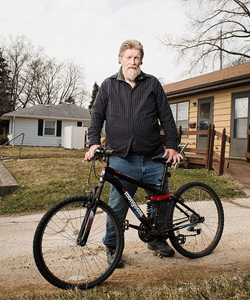
After losing his job and experiencing a number of health issues, Joseph of Waukesha found himself cooped up alone in his small studio apartment surrounded by junk mail, VHS tapes, and old exercise equipment.
“The apartment had been like that for about five years,” remembered Joseph. “But it was only when I was there all the time that I realized it was a problem.”
Joseph had once enjoyed socializing and getting out of the house to exercise but, after a battle with cancer and alcoholism, he began to isolate himself from the outside world.
 Looking around, he saw that his life was filled with what most people considered ‘junk,’ but Joseph believed this clutter was the only constant in his life.
Looking around, he saw that his life was filled with what most people considered ‘junk,’ but Joseph believed this clutter was the only constant in his life.
Then, one day, Joseph’s kitchen sink broke. For most, it would just be a simple phone call to the landlord to have him come in and replace it, but Joseph feared what would happen if his landlord saw the condition of the apartment.
“I realized I had to make a change or I was going to get evicted,” said Joseph.
The task ahead of him was daunting. He would have to sort through years of overwhelming clutter in order to bring his apartment back to a livable condition. Joseph reached out to Waukesha County Department of Health & Human Services for help and was referred to Catholic Charities’ Hoarding Intervention and Treatment Program, funded in part by United Way.
“United Way funds this program because it is the national leader in hoarding intervention,” said Krystina Kohler, United Way’s Financial Stability Portfolio manager. “Some problems in our community are obvious, but so many problems lie behind closed doors. Hoarding intervention is eviction prevention and it brings environmental and emotional safety to individuals and their families that are suffering in silence.”
Carla Alejo, director of in-home support services with the hoarding intervention program at Catholic Charities, began visiting Joseph once per week to help him declutter.
“United Way funding helps us offer hoarding-intervention services at low- or no-cost to the people who need them,” said Carla. “In addition to help decluttering, we are able to offer free behavioral health therapy to address the underlying issue at work. Hoarding is often a symptom of a broader mental health issue, like depression, anxiety, or addiction, and that is what we need to address in order to make a permanent change.”
Of those that participated in United Way-funded programs like this one, 89% felt safer and more secure and 91% felt they had a voice in making their own choices.
 As the weeks and months passed, Joseph’s living conditions improved. With the encouragement of Case Manager Garrett Hopkins, Joseph scheduled a doctor’s appointment for the first time in years, and worked with Garrett to make sure he had transportation to doctor’s appointments.
As the weeks and months passed, Joseph’s living conditions improved. With the encouragement of Case Manager Garrett Hopkins, Joseph scheduled a doctor’s appointment for the first time in years, and worked with Garrett to make sure he had transportation to doctor’s appointments.
Garrett also connected Joseph with another United Way-funded partner, Meals on Wheels, to get him back onto a healthy eating schedule. He started riding his bike again, which provided him a mode of transportation to allow him to get back into the community and to interact with others in the neighborhood.
“Now, I say ‘hi’ when I see my neighbors,” says Joseph. “I never used to do that.”
Joseph is still working on decluttering his apartment, but is making significant progress with the help of Catholic Charities staff that stop by twice a month. Joseph’s health has improved and he now regularly sees a behavioral therapist to address any ongoing mental health issues he may experience.
“If I didn’t have this help through Catholic Charities, I probably would have died,” says Joseph. “My apartment was a safety hazard, but now it is a place that I like to be.”
Read more stories